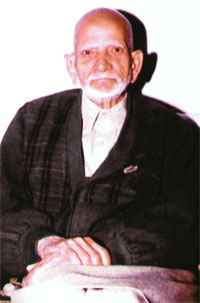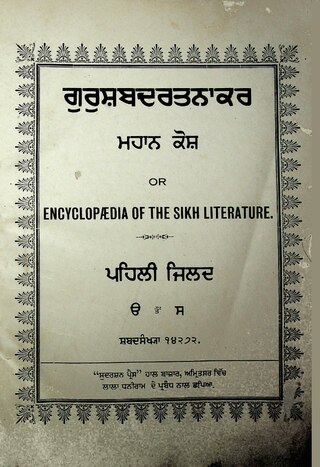
Gurmukhī or Gurumukhī is an Indic script predominantly used in present-day Punjab, India. It is an abugida developed from the Laṇḍā scripts, standardized and used by the second Sikh guru, Guru Angad (1504–1552). It is commonly regarded as a Sikh script, used by Punjabi Sikhs to write the Punjabi language, and is one of the official scripts of the Indian Republic, while the Arabic-based Shahmukhi script is used in Punjab, Pakistan.

Punjabi, sometimes spelled Panjabi, known historically as Pentapotamian, is an Indo-Aryan language native to the Punjab region of Pakistan and India. It is one of the most widely spoken native languages in the world with approximately 113 million native speakers.
Surjeet Kalsey is a Canadian poet, dramatist, short story writer and translator who lives in British Columbia and writes in both Punjabi and English. She has published a dozen books.

Shahmukhi is the right-to-left abjad-based script developed from the Perso-Arabic alphabet used for the Punjabi language varieties, predominantly in Punjab, Pakistan. It originated in the 12th century medieval Punjab through Sufi literature. It is generally written in the Nastaʿlīq calligraphic hand, which is also used for Persian and Urdu. Shahmukhi is one of the two standard scripts used for Punjabi, the other being Gurmukhi used mainly in Punjab, India.

Sayyid Abdullah Shah Qadri, known popularly as Baba Bulleh Shah and Bulleya, was a 17th and 18th-century Punjabi revolutionary philosopher, reformer and a Sufi poet, universally regarded as the "Father of Punjabi Enlightenment". He spoke against powerful religious, political and social institutions. He lived and was buried in Kasur.

Kafi is a classical form of Sufi music mostly in the Siraiki, Punjabi and Sindhi languages and originating from the Punjab, and Sindh regions in the Indian subcontinent. Some well-known Kafi poets are Baba Farid, Bulleh Shah, Shah Hussain, Shah Abdul Latif Bhittai, Sachal Sarmast and Khwaja Ghulam Farid. This poetry style has also lent itself to the Kafi genre of singing, popular throughout South Asia, especially Pakistan, Bangladesh and India. Over the years, both Kafi poetry and its rendition have experienced rapid growth phases as various poets and vocalists added their own influences to the form, creating a rich and varied poetic form, yet through it all it remained centered on the dialogue between the Soul and the Creator, symbolized by the murid (disciple) and his Murshid (Master), and often by lover and his Beloved.

Punjabi culture grew out of the settlements along the five rivers which served as an important route to the Near East as early as the ancient Indus Valley civilization, dating back to 3000 BCE. Agriculture has been the major economic feature of the Punjab and has therefore formed the foundation of Punjabi culture, with one's social status being determined by landownership. The Punjab emerged as an important agricultural region, especially following the Green Revolution during the mid-1960's to the mid-1970's, has been described as the "breadbasket of both India and Pakistan". Besides being known for agriculture and trade, the Punjab is also a region that over the centuries has experienced many foreign invasions and consequently has a long-standing history of warfare, as the Punjab is situated on the principal route of invasions through the northwestern frontier of the Indian subcontinent, which promoted to adopt a lifestyle that entailed engaging in warfare to protect the land. Warrior culture typically elevates the value of the community's honour (izzat), which is highly esteemed by Punjabis.
Lahnda, also known as Lahndi or Western Punjabi, is a group of Punjabi language varieties in the northwestern Indo-Aryan language family, spoken in parts of Pakistan and India. It is defined in the ISO 639 standard as a "macrolanguage" or as a "series of dialects" by other authors. Its validity as a genetic grouping is not certain. The terms "Lahnda" and "Western Punjabi" are exonyms employed by linguists, and are not used by the speakers themselves.

Sharif Kunjahi was a leading writer and poet of Punjabi. He was among the first faculty members of the Department of Punjabi Language at University of Punjab in the 1970s and contributed to Punjabi literature as a poet, prose writer, teacher, research scholar, linguist, lexicographer and translator.

Mir Tanha Yousufi was a Pakistani Punjabi and Urdu writer, best known for his Punjabi literature. He produced two short story collections and five novels in Punjabi. Most of his work was transliterated in Gurumukhi script in Indian Punjab. Besides his Punjabi works, he was a well known Urdu and Punjabi poet.

Guru Shabad Ratnakar Mahan Kosh, known by its more popular name of Mahan Kosh and by the English title Encyclopædia of the Sikh Literature, is a Punjabi language encyclopedia which was compiled by Bhai Kahn Singh Nabha over fourteen years. It was the first Punjabi encyclopedia, it contains more than 70,000 words, some of them has sufficient reference from Guru Granth Sahib, Dasam Granth, Gur Pratap Suraj Granth and from other Sikh books. It is considered a groundbreaking work in terms of its impact and its level of scholarship.

Surjit Patar is a Punjabi language writer and poet of Punjab, India. His poems enjoy immense popularity with the general public and have won high acclaim from critics.
Punjabi literature, specifically literary works written in the Punjabi language, is characteristic of the historical Punjab of Pakistan and India and the Punjabi diaspora. The Punjabi language is written in several scripts, of which the Shahmukhi and Gurmukhī scripts are the most commonly used in Pakistan and India, respectively.

The Khalsa Akhbar, Lahore, was a weekly newspaper and the organ of the Lahore Khalsa Diwan, a Sikh society. Published from Lahore in the Punjabi language, the newspaper was established in 1886 and functioned sporadically till 1905. Founded by Bhai Gurmukh Singh, a professor of Punjabi at the Oriental College, Lahore, who also established the Khalsa Press in Lahore, the paper was taken over by Giani Ditt Singh, a scholar and a poet.

Gurpreet Singh Lehal is a professor in the Computer Science Department, Punjabi University, Patiala and Director of the Advanced Centre for Technical Development of Punjabi Language Literature and Culture. He is noted for his work in the application of computer technology in the use of the Punjabi language both in the Gurmukhi and Shahmukhi script.
Rajendar Nath Rehbar was an Urdu Poet and Bollywood lyricist. He is the writer of the nazm Teri Khushboo Me Base Khat sung by ghazal singer Jagjit Singh. He is a disciple of the Urdu poet Ratan Pandoravi.

Shaikh Muhammad Sharif Sabir, better known as Sharif Sabir, was a Pakistani-Punjabi scholar, poet, researcher and educationist who is widely known for editing the most authentic version of Heer Waris Shah published in 1985. It took him over ten years to complete this work. Earlier, he had already written a book of poetry and edited Puran Bhagat of Qadir Yar, and translated parts of Gulistan and Bustan of Saadi Shirazi into Punjabi. He edited Sultan Bahu’s poetry collection Abiat-e-Bahu, Mian Mohammad Bakhsh's monumental work of Saiful Muluk, the poetry of Bulleh Shah and had just completed editing of the poetry of Baba Farid before his demise. Being also a scholar of Persian and Arabic, he undertook a Herculean translation of Ali Hajweri Gunj Bakhsh’s Kashf ul Mahjoob from Persian to Urdu. He was commissioned by the Punjab Auqaf Department.

Rekhta is an Urdu literary web portal started by Rekhta Foundation, a non-profit organisation dedicated to the preservation and promotion of the Urdu literature. The Rekhta Library Project, its books preservation initiative, has successfully digitized approximately 200,000 books over a span of ten years. These books primarily consist of Urdu, Hindi and Persian literature and encompass a wide range of genres, including biographies of poets, Urdu poetry, fiction, and nonfiction. The collection originates from public and research libraries in the Indian subcontinent. It serves content in multiple scripts such as Devanagari, Roman and, primarily, Nastaliq. It hosts books from centuries earlier and is recognized as the largest website in the world for the preservation of Urdu literature.

The Lehran, also referred to as Monthly Lehran, is a Pakistan-based magazine published monthly from Lahore in Shahmukhi Punjabi, with Gurmukhi transliterations. It is a literary magazine—of particular interest to university students—started by Syed Akhtar Hussein Akhtar, a Punjabi Language Movement activist, in March 1965 and is associated with the Modern Punjabi College in Old Anarkali.














